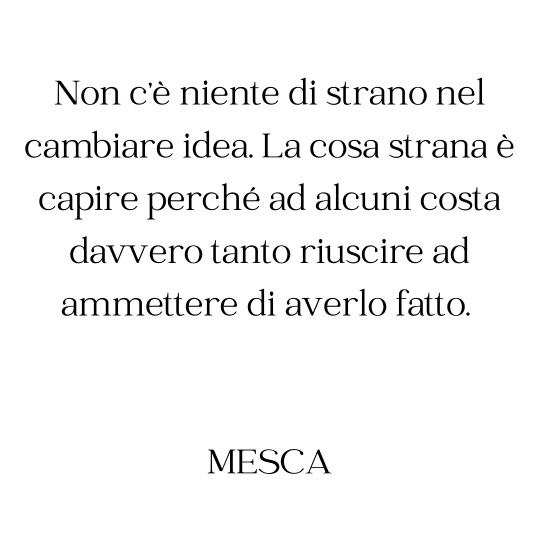#modi di dire
Text
youtube
LA NOIA | ANGELINA MANGO
Quanti disegni ho fatto
How many drawings I made
Rimango qui e li guardo
I stay here and look at them
Nessuno prende vita
None comes to life
Questa pagina è pigra
This paper is lazy
Vado di fretta
I am in a hurry
E mi hanno detto che la vita è preziosa
And they told me that life is precious
Io la indosso a testa alta sul collo
I wear it head held high on my neck
La mia collana non ha perle di saggezza
My necklace doesn't have pearls of wisdom (perle di saggezza=> idiomatic, could also be used ironically "words of wisdom")
A me hanno dato le perline colorate
They gave me colored beads
Per le bimbe incasinate con i traumi
For young girls messed up with traumas
Da snodare piano piano con l'età
To slowly untie while growing older
Eppure sto una Pasqua, guarda, zero drammi
And yet I'm doing great, look, no dramas (stare una Pasqua => idiomatic and usually very ironic, "to feel/do great")
Quasi quasi cambio di nuovo città
Maybe I (should) move to another city once again (quasi quasi => idiomatic, when you think about a chance you say "Maybe...")
Che a stare ferma a me mi viene, a me mi viene
If I stand still I get, I get ("a me mi" is a colloquial grammatically wrong concept that translates literally as "it comes to me"; it should be "a me viene" but for lyrical/musical lyrics is okay to find this in songs)
La noia
Bored(om) (for translations reasons -aka the sentence construction in English- I'm using the adjective "bored" here but "noia" is a noun so the literal translation is "boredom")
La noia
Bored(om)
La noia
Bored(om)
La noia
Bored(om)
Muoio senza morire, in questi giorni usati
I die without dying, in these used days
Vivo senza soffrire, non c'è croce più grande
I live without suffering, there's no greatest trial ("croce" here has a figurative meaning as in "portare una croce", idiomatic, meaning basically "to bring pain/affliction/trials *on your shoulders*")
Non ci resta che ridere in queste notti bruciate
We cannot do anything but laugh in those burnt nights (like the famous movie's title "non ci resta che piangere" but from a happier/ironic pov)
Una corona di spine sarà il dress-code per la mia festa
A crown of thorns will be the dress-code for my party
Ah, è la cumbia della noia, mmh
Ah, it's the cumbia of boredom
È la cumbia della noia
The cumbia of boredom
Total
definitive
Ah, è la cumbia della noia
Ah, it's the cumbia of boredom
È la cumbia della noia
It's the cumbia of boredom
Total
definitive
Quanta gente nelle cose vede il male
So many people see the evil in things ("quanto/a/i/e" if not used as a question usually means "a lot", "there are so many...")
Viene voglia di scappare come iniziano a parlare
One feels like running away as they start talking
E vorrei dirgli che sto bene ma poi mi guardano male
And I'd like to tell them I'm doing good but then they look at me sideways
Allora dico che è difficile campare
So I say that it's hard to keep on living
Business, parli di business
Business, you talk about business
Intanto chiudo gli occhi per firmare i contratti, mmh
In the meantime I close my eyes to sign contracts
Princess, ti chiama "princess"
Princess, (he) calls you "princess"
Allora adesso smettila di lavare i piatti
Then stop washing dishes now
Muoio senza morire, in questi giorni usati
I die without dying, in these used days
Vivo senza soffrire, non c'è croce più grande
I live without suffering, there's no greatest trial
Non ci resta che ridere in queste notti bruciate
We cannot do anything but laugh in those burnt nights
Una corona di spine sarà il dress-code per la mia festa
A crown of thorns will be the dress-code for my party
Ah, è la cumbia della noia, mmh
Ah, it's the cumbia of boredom
È la cumbia della noia
The cumbia of boredom
Total
definitive
Ah, è la cumbia della noia
Ah, it's the cumbia of boredom
È la cumbia della noia
It's the cumbia of boredom
Total
definitive
Allora scrivi canzoni?
So you write songs?
Sì, le canzoni d'amore
Yes, love songs
E non ti voglio annoiare
And I don't want to bore you
Ma qualcuno le deve cantare
But someone needs to sing them
Cumbia, ballo la cumbia
Cumbia, I dance the cumbia
Se rischio di inciampare almeno fermo la noia
If I risk to stumble at least I stop the boredom
Quindi faccio una festa, faccio una festa
Therefore I make/hold a party, I make/hold a party
Perché è l'unico modo per fermare, per fermare, per fermare, ah
Because it's the only way to stop, to stop, to stop, ah
La noia
Boredom
La noia
Boredom
La noia
Boredom
La noia
Boredom
Muoio perché morire rende i giorni più umani
I die because dying makes days more human
Vivo perché soffrire fa le gioie più grandi
I live because suffering makes the joys look bigger
Non ci resta che ridere in queste notti bruciate
We cannot do anything but laugh in those burnt nights
Una corona di spine sarà il dress-code per la mia festa
A crown of thorns will be the dress-code for my party
Ah, è la cumbia della noia, mmh
Ah, it's the cumbia of boredom
È la cumbia della noia
The cumbia of boredom
Total
definitive
Ah, è la cumbia della noia
Ah, it's the cumbia of boredom
È la cumbia della noia
It's the cumbia of boredom
Total
definitive
#music#musica#sanremo#sanremo 2024#sanremo2024#italian#it#langblr#italiano#italian language#italian langblr#languages#traduzioni#italian music#musica italiana#angelina mango#italian sayings#modi di dire#colloquial italian#tw death mention#Youtube#esc#escita#eurovision#esc 2024#esc24
44 notes
·
View notes
Text

#aforisma#scritture brevi#pensieri#vita#frasi italiane#frasi tumblr#ig post#igers#frasi pensieri#pensiero del giorno#riflessione personale#riflessioni#coerenza#citazione tumblr#citazioni#pensierieparole#modi di dire#persone#pensieri miei#frasi sagge#frasi vita#lifestyle#life lessons#instagram#ig story#follow#blog
16 notes
·
View notes
Text
PM Modi in Dwarka Underwater
#pm modi#modi#modi in dwarka#modi news#modi in japan#modi politics#modi di dire#modi government#pmmodi#bjp#narendramodi#dwarka#dwaraka#dwarkadhish
3 notes
·
View notes
Text
Inutile dirlo, siamo creature limitate, eppure ci definiamo a immagine di dio, come se al di fuori di noi stessi e del dio che ci ha creato, nulla ci somiglia a questo mondo. Eppure non siamo affatto diversi da qualunque altra specie di questo mondo, l'istinto, per quanto siamo senzienti, domina buona parte del nostro comportamento, del nostro modo di essere. Anche quando diciamo che a guidarci è solo la logica, il buon senso, alla fine a pensarci bene, è sempre e soltanto il nostro lato istintivo a muoversi, a darci l'impulso di fare, di pensare a una determinata azione.
In conclusione, per quanto ci determiniamo a essere civili e coscienziosi nell'agire, è sempre la bestia che è in noi a fare la prima mossa, L'istinto alla riproduzione, alla sopravvivenza, è sempre in base a questi bisogni che agiamo per quanto noi possiamo negarlo, la bestia in noi alla fine vince sempre
Autore: sconosciuto
5 notes
·
View notes
Text
Ti viru e ti cianciu.
5 notes
·
View notes
Text






Till the cows come home = a long time
0 notes
Text
Lo sapevi che...? Modi di dire di ieri e di oggi: “A ufo”
Quante volte avremo sentito usare l’espressione “a ufo” sapendo bene che è sinonimo di “a gratis”? Sì, ma da dove derivi e la storia che si accompagna a questo modo di dire non è sempre conosciuta.
Presumibilmente è nato dall’acronimo di Ad usum Fabricae Opera ovvero AUFO. La sigla accompagnava, nel Medioevo, i materiali utilizzati per la costruzione di strutture architettoniche esenti da dazi,…

View On WordPress
0 notes
Text
Siamo a maggio?
Ve lo chiedo perché il tempo vola! Eccome se vola!
In men che non si dica siamo arrivati, per il calendario, a maggio.
In realtà sembra una primavera in ritardo. Le temperature, al momento, fanno pensare più ai mesi di marzo che a maggio.
Le tanto attese pioggie arrivano ma lo fanno in maniera condensata e in alcune zone della nostra bella Italia arrecano più danni che benefici.
Alcuni…

View On WordPress
1 note
·
View note
Text
Since today it's the Ides of March...
"Tu quoque, Brute, fili mi!" (works both as a question and exclamation) are the famous Latin words that Julius Caesar is said to have pronounced after he recognized his son Brutus among his stabbers.
We occasionally repeat them mostly jokingly (especially in their abbreviated form "Tu quoque") either when we want to reprimand someone but also (faking a surprised reaction) when we find out someone we somehow trusted is at fault
#it#italian#langblr#italiano#italian language#italian langblr#languages#ides of march#italian things#italian stuff#sayings#modi di dire#italian history#italian sayings#tw stab mention
35 notes
·
View notes
Text

#pensieri#riflessioni#sensazioni#scritture brevi#persone#modi di dire#aforismi#frasi tumblr#citazione tumblr#qotd#aforisma#frasi pensieri#pensiero del giorno#frasi italiane#vita#dediche#pensierieparole#idea#riflessione personale#frasi sagge#igers#ig post#instagram
12 notes
·
View notes
Text
Culture - Defining, Identifying

Culture - When I hear the word, I picture a petri dish in an biology lab.
Recently, I met a former colleague from work at a social event. I asked him about his new job. He replied, "Great, the culture is completely different from where you worked before." We met at the same company. I was there when he left, but remained with him. Culture. I was curious.
Italiano What is it exactly? Culture is a concept that you hear first. It refers to a distant people, an ancient civilization, or a land from another time and place. Think about the food they ate, how it was cooked, their traditional clothing, how they were dressed, the music they made and the folklore that they shared with their guests at their evening entertainment. You are then asked by someone, "Where do your work?" They ask you to tell them. They then ask you, "What culture is that?" You stop dead in your tracks. Culture? What does culture mean to you? That's all I meant.
Over the years, I was fortunate to have worked for many companies. Little did I know that each company I worked for had a different culture.
My first job was at a tech startup with 23 employees. They hired me and I was fired three months later. They went bankrupt. Yes, I quit a stable company with good pay and benefits, as well as a great team of techies like me.
Another tech startup was the one I interviewed with three times. Yes, that's correct - three times. The president and his VP made me an offer a few days before Christmas. After I requested several days for a decision, the president looked at me for five seconds and then pulled the letter from me. He said, "Terry. I think I am going back to my offer." I never got to see the letter and didn't get to flip it over.
The multinational defense contractor was established many years later. After only three years of being there, I realized that they were notorious for not hiring people when contracts were inked and then letting them go once those contracts expired.
The large service provider is the one that has many departments and is process-driven, but very informal in its processes. Each group completed very similar tasks, but there was little consistency in the process.
Each of the four companies mentioned were displaying a part of their "culture". The first company was a gun-slinging employer despite having accumulated debts for several years. The second company expected all employees to give up their lives and do what the president asked, no matter whether it was Monday, Saturday, midnight, or holiday. The third company rode its contractual wave without losing a single day of their employees through any dry spells of work. The fourth was able to create an environment that allowed employees freedom to think and act as they please, regardless of any standard practice or process.
It is evident that culture does not come from faraway lands or distant pasts. It's right in front you, today and now. It may be something you don't think about or believe only at festivals and international events. Your workplace is a great example because of the repetitive hours you work there every day. Culture is defined by the amount of time you spend there. It's possible to hear the phrase "Company ABC", which means that employees work 70-hour weeks. Most organizations, regardless of how small or large, have a culture. It may be difficult to recognize cultural characteristics because we might spend less time volunteering. This may be due to the fact that the environment is not always the most welcoming. Most workplaces have a culture. Certain environments are known for their cultural characteristics. These traits are what they use in public advertising, literature, taglines, and company literature. There are also hidden, unwritten, and hard to identify traits. These are the traits employees don't talk about. You may be told, "Come work here and spend 10 years as I did" You may not be able to see patterns in other environments. It may take years to recognize a characteristic or aspect that you can call culture.
There is both good and bad culture. Good Culture - "Continual learning and development, regardless of our roles, are part of our culture." This is how many companies advertise their positive culture. This is usually found in the company's statement, branding, and public advertisements. What about their "bad culture?" As an employee, you will gradually have to witness, observe, and confirm their "bad" culture. This information will not be provided by your employer. This is what employees will call "experience". Some companies will defend their bad culture so hard that they lose their employees, lose money and fail to develop their products or overlook new opportunities. As an employee, you have to decide if you are able to accept and work in a culture that you don't agree with. Although it may seem easy, if you feel that the culture trait you dislike is preventing your growth, learning, advancement, morals or personal excellence, you might decide to leave. It is not worth it to live in a negative culture.
Many companies have fallen because of bad culture. Instead of making positive changes that will ensure the company's long-term survival and prosperity, the focus has been on justifying the culture, denial of any problem, looking the other direction, and not dealing with the negative aspects of the culture. It is possible for companies to not acknowledge bad culture. If they do, then they must do something about it. It is difficult. It can be difficult to change culture. Culture can be influenced by how they manage their employees and day-to-day operations. There is the possibility that some negative characteristics of culture will be eliminated and treated. It is a good thing if the positive traits are stronger than the negative ones. To make up for the negative traits, you can add more positive traits. Some companies even use the term "culture" as a "safe harbor". All attributes and traits, both good and bad, are unified under the umbrella of "culture". Negative traits are now a "hands-off" topic. Companies do not need to act on this "safe haven". It is not necessary to lead and drive change. Change is risky and some might say that it's bad. Each company needs a culture. Culture is good. We don't need to do anything, it's "our culture". It's accepted simply because it is good to have a culture. End of story.
One time, I was the only person responsible for managing and leading a project that was assigned to me. I was responsible for analyzing trends and identifying broken links. Then, I designed a process to address those broken links. Document it, then roll it out to all the groups. Key users were also educated. My manager and me met frequently to discuss the project. I would find out where resistance was coming from in the affected groups and what we could do to help them. My manager started to defend the group with which I was having difficulty on two separate occasions. He was not supporting me but defending them. I was shocked, perplexed and disappointed by the lack of support. His actions were impeding, if not delaying my efforts. My project was doomed for failure. This was the "culture" I found at work. It was a large, multi-service company with an oligopoly. It didn't like change or the speed at which my project required it to. The broken links continued and staff used the same process they had always used, no matter how inefficient. Managers were expected to be friendly with each other and not cause them any headaches. Because of this negative cultural trait, it was necessary to invest extra effort and time in reshaping the rollout. Roll out was slower and less effective than it should have been. It started to look more like a personal project, where I was trying make a name for my self and not as a fully-mandated project. It was rightly so that many didn't take it seriously, or even buy into it at the beginning, which cost me months of progress. It was a huge cost to adapt to their cultural bias.
1 note
·
View note
Text
Culture - Defining, Identifying
youtube
Culture - When I hear the word, I picture a petri dish in an biology lab.
Recently, I met a former colleague from work at a social event. I asked him about his new job. He replied, "Great, the culture is completely different from where you worked before." We met at the same company. I was there when he left, but remained with him. Culture. I was curious.
curiosità What is it exactly? Culture is a concept that you hear first. It refers to a distant people, an ancient civilization, or a land from another time and place. Think about the food they ate, how it was cooked, their traditional clothing, how they were dressed, the music they made and the folklore that they shared with their guests at their evening entertainment. You are then asked by someone, "Where do your work?" They ask you to tell them. They then ask you, "What culture is that?" You stop dead in your tracks. Culture? What does culture mean to you? That's all I meant.
Over the years, I was fortunate to have worked for many companies. Little did I know that each company I worked for had a different culture.
My first job was at a tech startup with 23 employees. They hired me and I was fired three months later. They went bankrupt. Yes, I quit a stable company with good pay and benefits, as well as a great team of techies like me.
Another tech startup was the one I interviewed with three times. Yes, that's correct - three times. The president and his VP made me an offer a few days before Christmas. After I requested several days for a decision, the president looked at me for five seconds and then pulled the letter from me. He said, "Terry. I think I am going back to my offer." I never got to see the letter and didn't get to flip it over.
The multinational defense contractor was established many years later. After only three years of being there, I realized that they were notorious for not hiring people when contracts were inked and then letting them go once those contracts expired.
The large service provider is the one that has many departments and is process-driven, but very informal in its processes. Each group completed very similar tasks, but there was little consistency in the process.
Each of the four companies mentioned were displaying a part of their "culture". The first company was a gun-slinging employer despite having accumulated debts for several years. The second company expected all employees to give up their lives and do what the president asked, no matter whether it was Monday, Saturday, midnight, or holiday. The third company rode its contractual wave without losing a single day of their employees through any dry spells of work. The fourth was able to create an environment that allowed employees freedom to think and act as they please, regardless of any standard practice or process.
It is evident that culture does not come from faraway lands or distant pasts. It's right in front you, today and now. It may be something you don't think about or believe only at festivals and international events. Your workplace is a great example because of the repetitive hours you work there every day. Culture is defined by the amount of time you spend there. It's possible to hear the phrase "Company ABC", which means that employees work 70-hour weeks. Most organizations, regardless of how small or large, have a culture. It may be difficult to recognize cultural characteristics because we might spend less time volunteering. This may be due to the fact that the environment is not always the most welcoming. Most workplaces have a culture. Certain environments are known for their cultural characteristics. These traits are what they use in public advertising, literature, taglines, and company literature. There are also hidden, unwritten, and hard to identify traits. These are the traits employees don't talk about. You may be told, "Come work here and spend 10 years as I did" You may not be able to see patterns in other environments. It may take years to recognize a characteristic or aspect that you can call culture.
There is both good and bad culture. Good Culture - "Continual learning and development, regardless of our roles, are part of our culture." This is how many companies advertise their positive culture. This is usually found in the company's statement, branding, and public advertisements. What about their "bad culture?" As an employee, you will gradually have to witness, observe, and confirm their "bad" culture. This information will not be provided by your employer. This is what employees will call "experience". Some companies will defend their bad culture so hard that they lose their employees, lose money and fail to develop their products or overlook new opportunities. As an employee, you have to decide if you are able to accept and work in a culture that you don't agree with. Although it may seem easy, if you feel that the culture trait you dislike is preventing your growth, learning, advancement, morals or personal excellence, you might decide to leave. It is not worth it to live in a negative culture.
Many companies have fallen because of bad culture. Instead of making positive changes that will ensure the company's long-term survival and prosperity, the focus has been on justifying the culture, denial of any problem, looking the other direction, and not dealing with the negative aspects of the culture. It is possible for companies to not acknowledge bad culture. If they do, then they must do something about it. It is difficult. It can be difficult to change culture. Culture can be influenced by how they manage their employees and day-to-day operations. There is the possibility that some negative characteristics of culture will be eliminated and treated. It is a good thing if the positive traits are stronger than the negative ones. To make up for the negative traits, you can add more positive traits. Some companies even use the term "culture" as a "safe harbor". All attributes and traits, both good and bad, are unified under the umbrella of "culture". Negative traits are now a "hands-off" topic. Companies do not need to act on this "safe haven". It is not necessary to lead and drive change. Change is risky and some might say that it's bad. Each company needs a culture. Culture is good. We don't need to do anything, it's "our culture". It's accepted simply because it is good to have a culture. End of story.
One time, I was the only person responsible for managing and leading a project that was assigned to me. I was responsible for analyzing trends and identifying broken links. Then, I designed a process to address those broken links. Document it, then roll it out to all the groups. Key users were also educated. My manager and me met frequently to discuss the project. I would find out where resistance was coming from in the affected groups and what we could do to help them. My manager started to defend the group with which I was having difficulty on two separate occasions. He was not supporting me but defending them. I was shocked, perplexed and disappointed by the lack of support. His actions were impeding, if not delaying my efforts. My project was doomed for failure. This was the "culture" I found at work. It was a large, multi-service company with an oligopoly. It didn't like change or the speed at which my project required it to. The broken links continued and staff used the same process they had always used, no matter how inefficient. Managers were expected to be friendly with each other and not cause them any headaches. Because of this negative cultural trait, it was necessary to invest extra effort and time in reshaping the rollout. Roll out was slower and less effective than it should have been. It started to look more like a personal project, where I was trying make a name for my self and not as a fully-mandated project. It was rightly so that many didn't take it seriously, or even buy into it at the beginning, which cost me months of progress. It was a huge cost to adapt to their cultural bias.
1 note
·
View note
Text
Anche l'occhio vuole la sua parte
Anche l’occhio vuole la sua parte
Mi piace cominciare con un proverbio, o un modo di dire. Sono una di quelle cose che stiamo perdendo.In casa mia ce n’erano tantissimi, di modi di dire. Uno per ogni situazione o problema, potrei dire. Mia cognata, mia sorella, mia nipote, quel po’ di famiglia che mi resta, mi hanno sempre detto li devi scrivere, se non li scrivi ce li dimentichiamo, vanno perduti.Così scrivere è una risposta…

View On WordPress
#allenamento#anche l&039;occhio vuole la sua parte#anima#coach#Come vestirsi#consulenti d&039;immagine#immagine#jeans#moda#modi di dire#pantaloni#pisa#proverbi#stile
1 note
·
View note
Text
Finalmente so come si dice "mani di merda" in inglese: "butterfingers!"
1 note
·
View note
Text
giannamaria guarda che se vuoi criticare la cultura occidentale però non c’è bisogno di rinnegarla così tanto quasi al punto da fare marcia indietro pure sulla parità di genere. ché quella non fa così schifo, dai
#no in realtà il ragionamento che fa è necessariamente più complesso e condivisibile#e cioè ragiona sul modo in cui le politiche di integrazione dei paesi proposti siano in realtà discriminatorie#e basate su presupposti razzisti e neo-coloniali relativi alla superiorità della cultura occidentale#e pertanto all’imposizione a chi arriva di rinunciare alla cultura di provenienza per integrarsi del tutto#in tutto ciò figura anche una promozione dei diritti delle donne + lgbt etc che si rivela solo strumentale#poiché alle destre nazionaliste non gliene frega una mazza ma è pur sempre un ottimo espediente retorico per rafforzare la propria posizione#contro ‘l’Altro’#e fin qui sono super d’accordo con quello che dice l’autrice. ci mancherebbe#solo che in alcuni passaggi mi pare abbondare eccessivamente nelle critiche alla cultura occidentale che certo. ha INFINITI problemi al suo#interno e figuriamoci poi nei rapporti con le altre culture#anche qui sono d’accordo con lei#MA non è che allora dobbiamo buttare via tutto. le conquiste relative ai diritti sono qualcosa su cui arroccarsi con le unghie e con i denti#è disgustoso razzista e ipocrita dire che x valori ci contraddistinguono e noi li incarniamo perfettamente mentre ‘Loro’ devono acquisirli?#assolutamente sì. proprio perché v. supra la cultura occidentale ha problemi anche con questo#detto ciò è auspicabile che una cultura dei diritti - anche quelli di matrice occidentale. elaborati certo grazie a un benessere di cui#abbiamo goduto anche a discapito di altri (e di ciò bisogna esserne consapevoli)#dicevo è auspicabile che una ampia e plurale cultura dei diritti si sviluppi e coinvolga tutti. secondo tempi modi e misure adeguati ma con#l’obiettivo di beneficiare tutti? io dico di sì in fin dei conti#non per tirare fuori il dibattito relativismo vs universalismo e non per fare la democristiana ma forse la via di mezzo tra un assoluto#relativismo e un aggressivo universalismo ha senso#boh è tutto molto interessante ci devo riflettere
10 notes
·
View notes